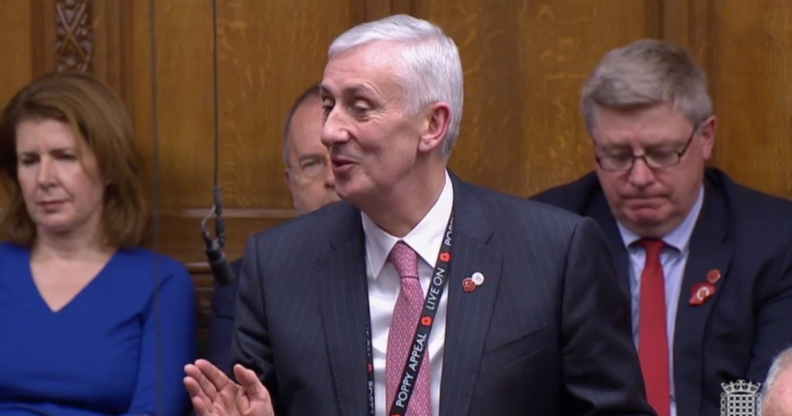Sir Lindsay Hoyle to replace John Bercow as Speaker of the House of Commons

Sir Lindsay Hoyle has been announced as the next Speaker of the House of Commons (Parliamentlive.tv)
Sir Lindsay Hoyle, Labour MP for Chorley in Lancashire, will replace John Bercow as the the next Speaker of the UK House of Commons.
Lindsay Hoyle served as Bercow’s Deputy Speaker for nine years and is generally regarded as a popular figure in parliament. He had long been considered a favourite for the prestigious role, with bookmakers predicting odds of 4/6.
Hoyle positioned himself as a stable choice in “unprecedented times,” and it’s hoped he will continue his predecessor’s legacy on LGBT+ rights after he made a promising statement on diversity and representation in parliament.
Announcing his bid for Speaker back in September, he wrote on Twitter: “I would like to thank [Bercow] for his dedication and service to our country. He has made many reforms.
“He is a champion of LGBT and BAME rights and we now have a more diverse and representative House than ever before. However, there is much more work to be done.”
2. I would like to thank Mr Speaker for his dedication and service to our country. He has made many reforms. He is a champion of LGBT and BAME rights and we now have a more diverse and representative House than ever before. However, there is much more work to be done.
— Lindsay Hoyle (@LindsayHoyle_MP) September 9, 2019
Hoyle beat six other candidates for the role – Chris Bryant, Meg Hiller, Edward Leigh, Harriet Harman, Eleanor Lang and Rosie Winterton.
He emerged as a strong lead in the first round of voting, gaining 211 votes. But with no candidates receiving more than 50 percent of the ballot in the first, second or third rounds of voting, a fourth round was called.
Hoyle and Chis Bryant went head to head in the final round, and Hoyle won with 325 votes compared to Bryant’s 213.
Thanks to all those who nominated me to be Speaker@CharlesWalkerGB @marionfellows @tracey_crouch @MarshadeCordova @DavidCrausby @joanryanEnfield @SeemaKennedy @Pauline_Latham @KevanJonesMP @SirRogerGale @William_Wragg @Chris_Matheson @khalid4PB @CarolineFlintMP @Jamie4North ? pic.twitter.com/VyCmba8FaN
— Lindsay Hoyle (@LindsayHoyle_MP) November 4, 2019
Hoyle’s pitch appeared to centre on three key ideas: “He is the stability candidate who won’t cause drama, he will continue the reforms Bercow made on LGBT+ and BAME rights and representation, and he is scrupulously impartial,” suggested Buzzfeed News.
Hoyle’s voting record on LGBT+ issues is mixed. In 1998 and 1999 he voted in favour of lowering the age of consent for homosexual sex, and in 2004 he voted in favour of civil partnerships.
However, he has abstained from nearly every other vote relating to LGBT+ rights.
But analysis by The Public Whip (which takes into account the importance of voting activity relative to party policy) notes that Hoyle has voted strongly in line with “the gay vote,” awarding him a score of 87.9 percent.

